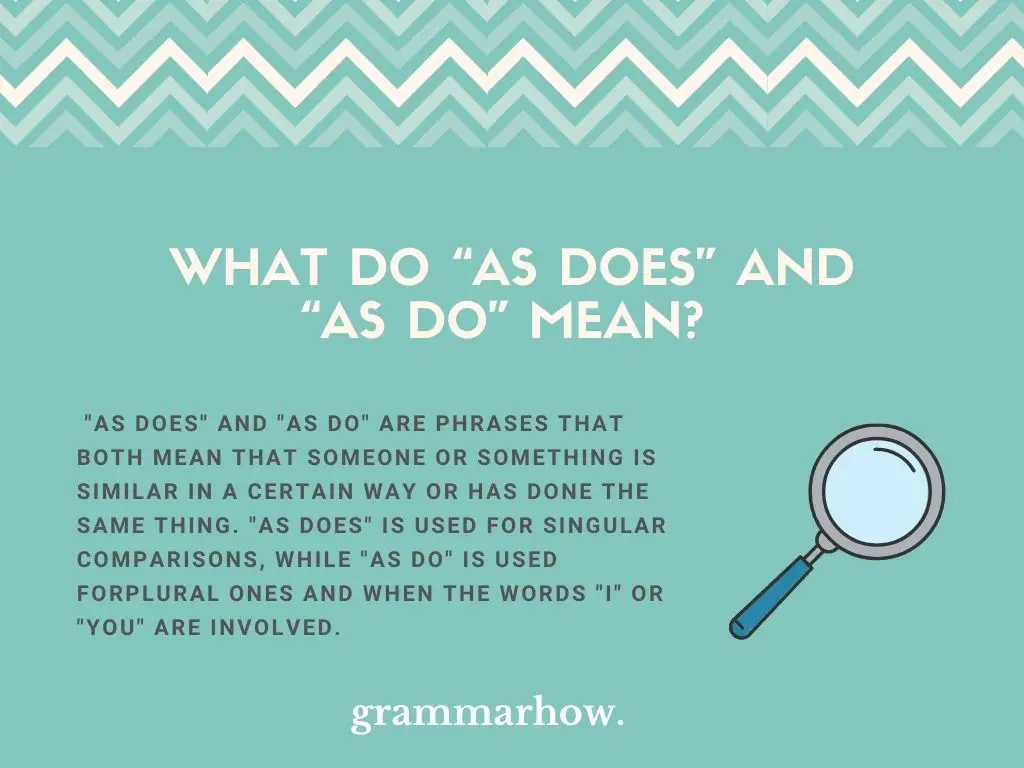There are many phrases in the English language. In this article, we will be explaining the meaning of two often used phrases: “as does” and “as do”. This article also explains when to use one or the other and explores other phrases that are synonymous with these.
What Do “As Does” and “As Do” Mean?
“As does” and “as do” are phrases that both mean that someone or something is similar in a certain way or has done the same thing. “As does” is used for singular comparisons, while “as do” is used for plural ones and when the words “I” or “you” are involved.

The word “as” is used in the phrases “as does” and “as do” to mean “in the same way”. “As does” and “as do” are phrases that are used to compare a thing or a person to something or someone else.
If only one thing or one person is being compared to another, then “as does” is the phrase to use, as seen in the following sentence:
- I love the way this spaghetti is cooked, as does Michelle.
If multiple things or people are being compared, then “as do” is the appropriate phrase to use. Take the following sentence, for example:
- My children love the way this spaghetti is cooked, as do my sister’s children.
The same is true if one thing or person is compared to multiple things or persons:
- My mother loves the way this spaghetti is cooked, as do my sister’s children.
“As do” is only used for singular comparisons when the phrase made is “as do I” or “as do you”, such as in the following examples:
- Michelle loves the way this spaghetti is cooked, as do I.
- Michelle loves the way this spaghetti is cooked, as do you.
Examples of How To Use “As Does” In A Sentence
Here are some sentences that show how to use “as does” in a sentence:
- Martha plays the piano for the orchestra every Saturday, as does Michael.
- Falling in love takes time for some people, as does falling out of love.
- I really dislike the idea of applying for the internship next semester, as does Lisa.
- The brand of orange juice contains a lot of Vitamin C, as does this brand of grape juice.
- Chelsea holds a special place in Mrs. Patterson’s heart, as does Lucas.
- The city of Paris has many tourist attractions, as does the city of Rome.
- The length of infection varies from person to person, as does the severity of the symptoms.
Examples of How To Use “As Do” In A Sentence
Here are some sentences that show how to use “as do” in a sentence.
- Marilyn loves historical fiction, as do I.
- You want this job, as do I.
- I know how much Carolyn cares about you, as do you.
- Hannah needs this experiment to work out, as do you.
- You know very very well why Cole cannot know, as do we.
- Mark knows, as do we all, that nothing in life ever comes easy.
- Peter needs to hear what Charlotte has to say, as do we.
As Do I vs. So Do I
The phrases “as do I” and “so do I” both establish a similarity between the speaker and something or someone else. However, “so do I” is more often used in an informal setting while “as do I” is more often used in a formal setting.
The phrases “as do I” and “so do I” can be interchangeable. They are both used to establish a similarity between the speaker and something or someone else.
Consider the following sentences:
- You care about Mary, as do I.
- You care about Mary, and so do I.
Both sentences have the same meaning. They both express that the speaker (“I”) and the person to whom the speaker is talking (“you”) both care about Mary.
The difference between the two sentences is that you are more likely to find the first sentence in a more formal setting, such as in formal speeches. On the other hand, you are likely to find the second sentence in a less formal setting, such as in casual conversation.
As Does/Do – Synonyms
The phrases “as does” and “as do” are not the only phrases of their kind in the English language. Other phrases and words are synonymous with these, such as:
- so do/so does
- as well as
- also
- like
- similar to
